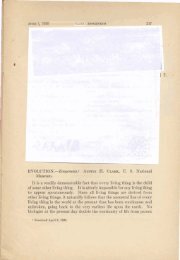A Translation of a Zosimos' Text in an Arabic Alchemy Book
A Translation of a Zosimos' Text in an Arabic Alchemy Book
A Translation of a Zosimos' Text in an Arabic Alchemy Book
You also want an ePaper? Increase the reach of your titles
YUMPU automatically turns print PDFs into web optimized ePapers that Google loves.
172 KHADEM<br />
In <strong>an</strong>other section <strong>of</strong> the book Zosimos is quoted as say<strong>in</strong>g: "Knowledge is<br />
treated with great honor, because only a philosopher, who has acquired Wisdom,<br />
scientifically <strong>an</strong>d practically, is able to use it. An experimentalist may obey his<br />
master when he tells him: Take this <strong>an</strong>d do such <strong>an</strong>d such a th<strong>in</strong>g, evaporate it,<br />
dissolve it, distill it, <strong>an</strong>d so on till the end <strong>of</strong> the work. That aide does not<br />
underst<strong>an</strong>d <strong>an</strong>yth<strong>in</strong>g beyond how to do th<strong>in</strong>gs; whereas the person who compre-<br />
hends the science <strong>an</strong>d the practice, knows how <strong>an</strong>d why someth<strong>in</strong>g is evaporated,<br />
i.e. the purpose <strong>of</strong> the evaporation. This is why, to become a philosopher, one<br />
must know the aim <strong>of</strong> Wisdom <strong>in</strong> each step <strong>of</strong> the work."<br />
The book also conta<strong>in</strong>s several quotes made by famous Greek philosophers,<br />
such as Aristotle, whose discussions with Plato are reproduced <strong>in</strong> some detail,<br />
<strong>an</strong>d Democritus, who is quoted as say<strong>in</strong>g: "The stone is not formed until it has<br />
gathered all the colors that exist <strong>in</strong> the universe, <strong>an</strong>d until it has been colored<br />
with all the simple <strong>an</strong>d complex colors."<br />
Galen is quoted as say<strong>in</strong>g: "To determ<strong>in</strong>e the amount <strong>of</strong> a drug to be used as<br />
<strong>an</strong> <strong>an</strong>tidote, select three doses; one <strong>in</strong> great excess, let it be forty eight (48) units<br />
<strong>of</strong> weigh; drams, iotas, or <strong>an</strong>y other unit; the second <strong>in</strong> the middle, which is<br />
twenty four (24), <strong>an</strong>d the second (third), which is the least, six (6) parts. To<br />
determ<strong>in</strong>e which <strong>of</strong> these to use, consider all the variables, the powers, <strong>an</strong>d the<br />
reasons, as well as the benefits ga<strong>in</strong>ed by <strong>in</strong>creas<strong>in</strong>g the dose to forty eight units<br />
or decreas<strong>in</strong>g it to six. If one condition requires <strong>an</strong> <strong>in</strong>crease <strong>an</strong>d one condition a<br />
decrease, then you use twenty four."<br />
The book also conta<strong>in</strong>s quotes from lesser known personalities such as Androma-<br />
chus (a contemporary <strong>of</strong> Galen), Heracles, Tamagus <strong>an</strong>d "Bal<strong>in</strong>as" (Apollonios<br />
<strong>of</strong> Ty<strong>an</strong>a). Also quoted, are mythical characters, such as Hermes Trismegistus, his<br />
son Tata, <strong>an</strong>d his daughter Queen Cleopatra. For example, Hermes is quoted as<br />
say<strong>in</strong>g: "A body will not accept a soul that is not its own, <strong>an</strong>d a soul will not<br />
reside <strong>in</strong> a body that is not its own. Thus a hum<strong>an</strong> body will not accept the soul<br />
<strong>of</strong> a bird, <strong>an</strong>d the soul <strong>of</strong> a bird will not reside <strong>in</strong> a hum<strong>an</strong> body." Unfortunately,<br />
some Greek philosophers quoted could not be identified because <strong>of</strong> lack <strong>of</strong> records,<br />
or because tr<strong>an</strong>sliteration had altered their names beyond recognition.<br />
Among the Greek literature cited <strong>in</strong> Part Two <strong>of</strong> the text are: "The <strong>Book</strong> <strong>of</strong><br />
Revelation" (Istigla') by Aristotle; "The Basics'' by Apollonios <strong>of</strong> Ty<strong>an</strong>a (Bali-<br />
nas), from which a passage is quoted, describ<strong>in</strong>g how to dye elixirs with yellow<br />
colors extracted from a sun flower like pl<strong>an</strong>t called <strong>in</strong> Greek "Lumenia", <strong>an</strong>d<br />
"Letters from Ost<strong>an</strong>es to Cleopatra", which are discussed <strong>in</strong> some detail.<br />
Content <strong>of</strong> the <strong>Book</strong><br />
Both parts <strong>of</strong> the book start with a discussion <strong>of</strong> the "four elements" (fire,<br />
air, water, <strong>an</strong>d earth) <strong>an</strong>d the "four natures" (hot, cold, moist, <strong>an</strong>d dry), <strong>an</strong>d







